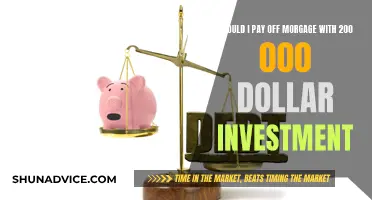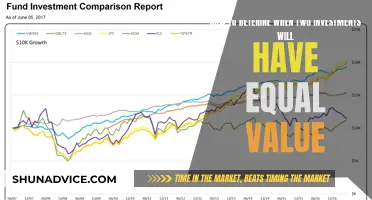
Whether to invest in shares or pay off a mortgage is a common dilemma for many homeowners. While there is no one-size-fits-all answer, there are several factors to consider when making this decision. These include an individual's financial circumstances, risk tolerance, mortgage rate, expected investment returns, and personal financial goals.
Paying off a mortgage early can provide several benefits, such as saving on interest costs, achieving debt-free status faster, and building home equity. On the other hand, investing offers the potential for higher returns, liquidity, and employer-matching contributions in retirement accounts. Ultimately, the decision depends on an individual's unique situation and their comfort with taking on investment risk.
| Characteristics | Values |
|---|---|
| Risk tolerance | Depends on the individual |
| Interest rates | Low interest rates make it a good time to invest. |
| Returns | Returns on investments are not guaranteed but are likely to be higher than mortgage interest rates. |
| Peace of mind | Being debt-free can reduce stress and provide peace of mind. |
| Tax deductions | Paying off a mortgage early may result in losing out on tax deductions. |
| Liquidity | Investments are typically more liquid than money invested in a house. |
| Retirement | The earlier you start saving for retirement, the better. |
What You'll Learn

Paying off mortgage early saves thousands in interest
Paying off your mortgage early can save you thousands of dollars in interest over the long run. Even a small extra monthly payment can allow you to own your home sooner. However, it's important to weigh up the benefits and drawbacks, as well as considering your own financial situation and goals.
Benefits of paying off your mortgage early
- Save on interest: Paying off your mortgage early has the potential to save you thousands of dollars in interest.
- Debt-free faster: Getting rid of mortgage debt and not having to worry about monthly payments can offer peace of mind.
- Build home equity: Paying off your mortgage will increase the equity you have in your home, which can help you qualify for refinancing and save you even more money in the long run.
- More room in your budget: Once you pay off your mortgage, you can use the money you were spending on monthly payments for other purposes.
Drawbacks of paying off your mortgage early
- Opportunity cost: Any money that goes towards your mortgage isn't going towards another financial goal, such as investing or saving for retirement.
- Wealth is tied up: Property is an illiquid asset, meaning you can't convert it to cash quickly or easily.
- Loss of tax deductions: You may miss out on tax deductions for mortgage interest and those earned through tax-advantaged retirement accounts.
- Prepayment penalties: In some cases, paying off your mortgage early can result in prepayment penalties, although these usually expire a few years into the loan.
Key considerations
- Risk: Investing in the stock market is riskier than paying off your mortgage but offers the potential for higher rewards.
- Retirement savings: The earlier you start saving for retirement, the better, as it allows you to take advantage of compound interest.
- Mortgage interest rate: If you have a low mortgage rate, you can typically make more money by investing.
- Other debt: If you have other debt with higher interest rates, such as credit card debt or student loans, it may be more beneficial to focus on paying this off first.
- Emergency fund: Make sure you have enough money set aside for emergencies before putting extra money towards your mortgage.
Strategies for paying off your mortgage early
- Biweekly payments: Paying your mortgage on a biweekly basis instead of monthly will help you pay off your debt faster without a strain on your finances.
- Extra payments: Making one extra payment a year or committing to a slightly higher monthly payment can help you pay off your mortgage years ahead of schedule.
- Refinance: If you've built up significant equity in your home, consider refinancing to a shorter term. This will increase your monthly payments but will save you money on interest and help you own your home much faster.
When to pay off your mortgage early
The right time to pay off your mortgage early depends on your personal financial situation. It's important to consider the potential tax consequences and any prepayment penalties, as well as whether it makes more sense to use the funds elsewhere, such as investing or paying off high-interest debt.
Seeking Investors for Your Farm?
You may want to see also

Peace of mind from being debt-free
Being debt-free can bring peace of mind and a sense of financial freedom. Here are some benefits of paying off your mortgage and becoming debt-free:
Interest savings:
One of the biggest advantages of paying off your mortgage early is the potential to save thousands of dollars in interest payments. The earlier you pay off your loan, the more you save in interest over the long term.
Peace of mind and reduced stress:
If the idea of being in constant debt worries you, paying off your mortgage early can ease your burden and provide peace of mind. You won't have to worry about monthly payments, and the risk of losing your home due to foreclosure in case of financial emergencies is eliminated.
Building equity and accessing credit:
Paying off your mortgage increases the equity you have in your home, which can be leveraged to take out a home equity loan or line of credit (HELOC). This can help you achieve other financial goals, such as making home improvements or paying off other higher-interest debts.
Budget flexibility:
Once your mortgage is paid off, the money that was previously allocated for monthly payments can be used for other purposes, giving you more flexibility in your budget. You may choose to invest this money, save it for retirement, or allocate it towards other financial goals.
Improved financial stability:
Being debt-free can improve your overall financial stability and resilience. You won't have to worry about making ends meet or struggling with high-interest debt. This can be especially beneficial as you approach retirement, as it reduces your monthly expenses and provides more financial security.
While paying off your mortgage early has its advantages, it's important to consider all factors, including your financial situation, interest rates, and investment opportunities. Consult with a financial advisor to determine the best course of action for your specific circumstances.
REITs: Recession-Proof Investment?
You may want to see also

Pros and cons of investing
Investing your extra cash instead of paying off your mortgage early has some benefits and drawbacks. Here are the main ones to consider.
Pros of investing
- Higher returns: The biggest benefit of investing your money instead of using it to pay down your mortgage faster is the ROI. For many years, average stock market returns have been significantly higher than mortgage rates, which means you stand to gain quite a bit from the difference.
- Liquid investment: Unlike a home that ties up your wealth, having your money in stocks, bonds and other market investments means you can easily sell and access your money if you need to.
- Employer match: If you choose to invest your extra funds in a retirement account and your employer offers a match, that’s additional free money that you get to enjoy compound earnings on over time. You’d also be investing pre-tax dollars, which could help you afford larger contributions.
Cons of investing
- Higher risk: There is more volatility in the stock market than in the housing market year over year, so you should be sure your investing timeline is long enough to weather ups and downs. You also need to make sure that your investment strategy matches your risk tolerance and you’re mentally prepared to take some hits.
- Increased debt: Choosing to invest your money may not be the best option if you don’t like the idea of having debt to your name. Until your mortgage is repaid, you don’t actually own your home—the bank does. And there will always be some risk that you could lose your home if you aren’t able to make the payments.
The Investment Payback: Understanding the Timeline of Returns
You may want to see also

Risk tolerance
- Financial Circumstances: Individuals with higher incomes may have a higher risk tolerance as they can afford potential losses. Those with limited financial resources may prefer the certainty of paying off their mortgage to avoid the risk of investment losses.
- Investment Goals: The proximity to retirement or other financial goals plays a role in risk tolerance. Those closer to retirement may opt for the safer option of paying off their mortgage to reduce overall debt, while younger individuals may be more inclined to take on the higher risk of investing for potential higher returns.
- Emotional Comfort: Some individuals are averse to debt and seek the peace of mind that comes with being debt-free. For them, paying off the mortgage may be a priority despite potentially lower returns compared to investing. Others may be comfortable carrying mortgage debt if they believe they can generate higher returns through investments.
- Market Conditions: The state of the stock market and interest rates also impact risk tolerance. During periods of high stock market volatility or rising interest rates, the perceived risk of investing may increase, making the stability of paying off a mortgage more appealing.
- Investment Horizon: The time horizon for investments matters. Longer investment horizons allow for riding out short-term market fluctuations, making investing a more attractive option for those with a longer time frame.
- Risk Assessment: It is essential to assess the risks associated with each option. Paying off a mortgage early eliminates the risk of investment losses but may result in lower overall returns. Investing carries the risk of losses but also offers the potential for higher returns.
Market Volatility: Should You Invest Now?
You may want to see also

Mortgage interest rate
When deciding whether to invest in shares or pay off your mortgage, one of the most important factors to consider is your mortgage interest rate. This is because the interest rate determines how much you will pay over the life of the loan.
The interest rate on a mortgage depends on various factors, including the borrower's credit score, the size of their down payment, the loan amount, the loan structure, the location of the property, and whether the borrower is a first-time homebuyer. Generally, a higher credit score and a larger down payment will lead to a lower interest rate.
Additionally, economic factors, such as inflation, unemployment rates, and the Federal Reserve's monetary policy, can influence mortgage interest rates. For example, when the Federal Reserve raises the federal funds rate, interest rates for home loans tend to increase as well.
When deciding whether to invest in shares or pay off your mortgage early, it is crucial to compare the potential return on investment with the interest rate on your mortgage. If you have a low mortgage rate, investing your money may be more profitable. However, if your mortgage rate is high, you may want to prioritise paying off your mortgage to reduce the overall cost of the loan.
It is worth noting that paying off your mortgage early can have its advantages and disadvantages. One significant advantage is the potential to save thousands of dollars in interest payments. On the other hand, paying off your mortgage early may result in opportunity costs, as the money used could have been invested elsewhere for higher returns. Additionally, paying off your mortgage early can reduce your liquidity, as accessing that money would require selling your house.
In conclusion, when deciding whether to invest in shares or pay off your mortgage, carefully consider your mortgage interest rate and weigh it against potential investment returns. Consult a financial advisor to assess your specific financial situation and goals.
Overseas Investment: Why the Move?
You may want to see also
Frequently asked questions
Paying off your mortgage early can save you thousands in interest payments and give you peace of mind. However, it also means missing out on potential investment opportunities and losing tax deductions.
Investing can offer higher returns and more liquidity, and if your employer matches your contributions, you get to enjoy compound earnings. However, there is a higher risk involved and you won't be eliminating your debt.
Consider your risk tolerance, how much of your mortgage is left to pay, your mortgage rate, expected investment returns, and your financial goals.







